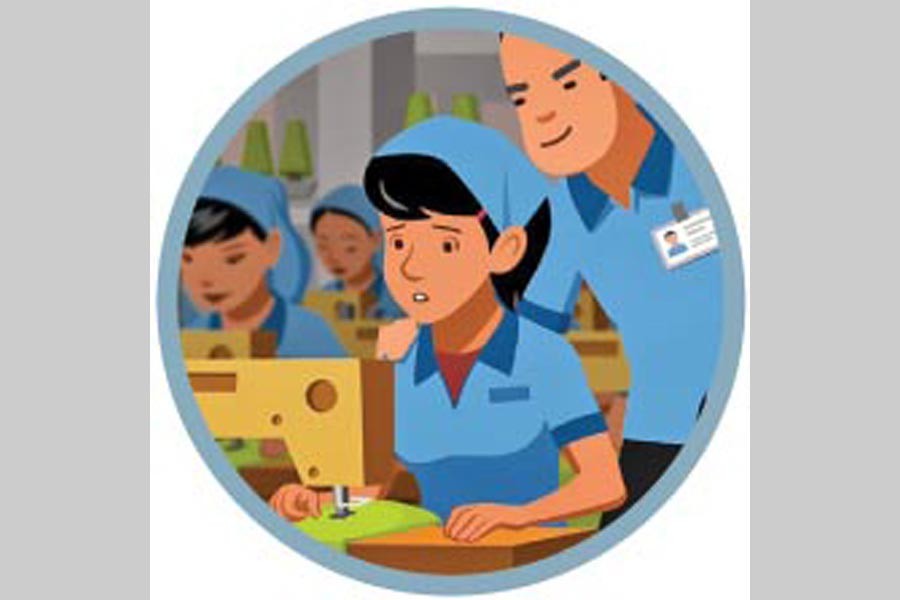The recent decision to form what has been termed RMG Sustainability Council (RSC) may sound no different from many other councils/committees that keep appearing routinely in the media - often as vague promises to do things better. However, details as to the role of the RSC make one convinced about the urgent need of such a council. Observers aware of the country's garment export scenario will surely consider it a timely move in that the RSC is likely to not only streamline the country's most rewarding export sector but also address in a proactive manner some critically business-impeding difficulties facing the sector.
The RSC, in a nutshell, is a tripartite platform of apparel makers, buyers and labour rights groups to ensure workplace safety and compliance of standards in the garment sector. Media reports say the RSC will be formally formed by November 25 as agreed upon by brands, union leaders and factory owners recently. The decision came after meetings among these key stakeholders. It may be recalled that following the Tazreen Fashion fire in 2012 and Rana Plaza disaster in 2013, the country's garment industry was in a tight spot as allegations about improper, risky workplaces in the country were so widespread and indiscriminate that industry leaders and the government agreed to launch a factory remediation scheme under supervision of two teams representing the two clusters of major international buyers - the European and North American (mainly US) buyers. These teams - Accord represented mostly European brands and retailers, and Alliance represented the North American buyers and brands. Both teams were engaged for five years.
It was a long and arduous task given the hugely varying nature of remediation needs involving among others inspection of structural designs and fire safety provisions in thousands of factories. There were occasional hiccups as inspection results demanded massive overhauling of a large number of factories. However, over the years more than eighty per cent of the flawed factories were set right.
The team representing the North American buyers and brands -- Alliance, has already left on completion of their job in 2018. Accord, too, has done a commendable job, although a good number of factories from which neither the European buyers nor the North Americans source their imports are left out and currently these are being looked into by local inspection teams formed by the government.
Accord which represented more than 200 global apparel brands and retailers from Europe is still in the country. Its tenure was to end in May, 2018. The government extended its stay as Accord wanted more time to complete its job. In May this year, the Supreme Court allowed Accord to continue its activities for 281 days after Accord and the BGMEA signed a memorandum of understanding (MoU) in this regard. As per the MoU, the proposed RMG Sustainable Council would be set up during this period and inherit both the Accord's staff and infrastructure after expiry of its tenure.
The RSU thus will act as a successor of Accord in that it will conduct inspection, monitoring and certification for exporting factories. In so doing, the RSC will also take over all activities and staff of Accord.
The decision regarding the RSU has been reached unanimously in the meetings that preceded the decision. All parties reportedly discussed a wide range of issues to ensure a smooth transition of the Accord and its functions related to inspections, remediation, training and safety complaints mechanism to the RSC by the end of May 2020.
Expressing satisfaction over the matter, Edward David Southall, Head of global sourcing of LC Waikiki, and representative of European brands said, "RSC is an unprecedented national initiative, uniting industry, brands and trade unions to ensure a sustainable solution, based on a unified compliance standard, to carry forward the significant accomplishments made on workplace safety in Bangladesh." The parties agreed on the importance of jointly developing the Memorandum & Articles of RSC and a 'Transition Agreement', drafts of which will be prepared following an agreed timetable," said a joint statement. The RSC will also work for building industrial relations, skills development and maintaining environmental standards. It has been learnt that the draft Articles of Association of the RSC and its functions would be prepared by next month.
From the forgoing, it appears that RSC is going to be a foremost platform for ensuring the mandated works of workplace safety and compliance of standards. And a good deal of its success will rest with holding regular dialogues with factory Unions. No doubt, this two-fold activity, if conducted in a fruitful manner, will place the RMG industry on a foundation stronger than ever before. This is where sustainability comes in, and the industry leaders surely will spare no effort to make sure that the RSC is given the right space.


